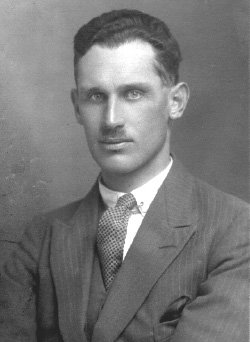View entry
Name: CROMPTON, Harry

Birth Date: 26 June 1896 Nafferton, Yorkshire
Death Date: 27 Mar 1973 Horsley, Surrey
First Date: 1927
Last Date: 1966
Profession: Estate manager, Hoey's Bridge
Area: Eldoret, 1937 Kitani, Cottam Farm Kitale partner with Meyler
Married: In Mombasa Cathedral 1930 Frances Eileen Richardson 'Jill' b. 12 Sep 1902 Sculcoates, d. 1996 Surrey
Children: Sheila Margaret [Meilstrom] (27 Apr 1937 Kitale); Heather Caton (1962)
Book Reference: Red 31, Hut, EAWL
War Service: Royal Artillery
General Information:
Gazette 6 Dec 1938 Trans Nzoia Voters List
EAWL Mr Crompton 1930-40 worked as manager to Col. Frank le Breton on his very large coffee farm near Hoey's Bridge, on the Nzoia River - I think Col. le Breton was given the land on the soldier-settler scheme after WW1. When WW2 was declared we were on holiday in a rented house at Nyali and were given about 3 hours to pack up and leave Mombasa by the daily 4 p.m. train, otherwise we would be unable to leave until the end of the war! My husband had survived through all the 1st War fighting on the Somme, and was considered more use running a group of farms in the Trans Nzoia to release younger men to join the forces. A younger friend, Roddy Mylor offered my husband a half share on his undeveloped coffee farm on Elgon, so that he could be free to join the war effort in England - Harry was to develop the farm and he ran a group of 6 other farms from there with an educated African headman on each one. He started a Social Centre & small African school at Sabati and we sent an educated African girl to be trained as a Social Worker for a year. Then I started Women's Clubs (Mandeleo ya Wanawake) on all the surrounding farms, also an Adult Literacy Club on our farm, for which we built a large hall on our farm. By the time of Uhuru life was becoming pretty difficult. The police discovered our 2 Kikuyu gardeners had sharpened pangas to do us in and take over the property, and later gangs of youths were roaming about intimidating our house boys and farm workers, encouraging them to go on strike and then take over. Finally we sold the farm to a cooperative of 3 Africans for about £5000 (including the furnished house) and left in Spring 1966, with very little money to live on in England and no pension until we were 80!
